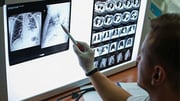
FRIDAY, Sept. 9, 2022 (HealthDay News) -- Lung cancer CT screening scans can catch tumors at an earlier and more treatable stage, a new study indicates.
The number of stage 1 lung cancers detected by doctors increased 8.4% after low-dose CT screening scans were implemented across four different health care systems, according to findings published recently in the Journal of Thoracic Oncology.
Regular lung cancer screenings also were linked to a 6.6% decrease in stage 4 cancers, because the tumors were caught earlier, researchers said.
The statistics were drawn from four major health systems that are part of a consortium aimed at optimizing lung cancer screenings -- Henry Ford Health System in Detroit, Kaiser Permanente Colorado, Kaiser Permanente Hawaii and the University of Pennsylvania Health System.
Researchers looked at nearly 3,700 patients diagnosed with lung cancer at the four systems between January 2014 and September 2019, looking specifically at how advanced the cancers were when discovered.
By the end of the study, CT scan screens were catching about 20% of the lung cancer cases diagnosed at the centers, said researchers led by Dr. Anil Vachani, from the University of Pennsylvania.
In addition, the number of early-stage tumors had increased while the number of late-stage tumors had declined – showing that doctors were catching lung cancer when patients still had the best chance of survival.
This also showed that the screening did not result in over-diagnosis, which can cause patients to undergo unnecessary biopsies and other follow-up testing, the researchers said in a journal news release.
More information
The American Cancer Society has more about lung cancer screening.
SOURCE: Journal of Thoracic Oncology, news release, Sept. 7, 2022
Back

The news stories provided in Health News and our Health-E News Newsletter are a service of the nationally syndicated HealthDay® news and information company. Stories refer to national trends and breaking health news, and are not necessarily indicative of or always supported by our facility and providers. This information is provided for informational and educational purposes only, and is not intended to be a substitute for medical advice, diagnosis, or treatment.






